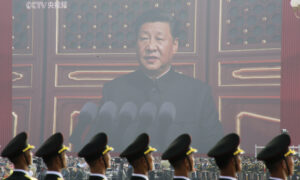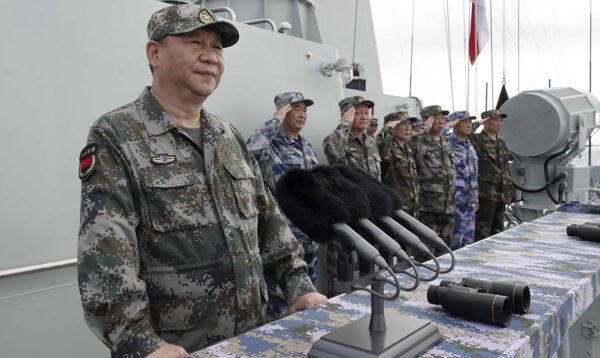Xi Jinping Changes Head of Central Theater Command 3 Times in 18 Months
China’s Central Theater Command (CTC) has appointed its third commander in one and a half years. China observers have said that the move is another effort by Xi Jinping’s to secure military cronies. But a couple of abnormalities also point to Xi’s insecurities in relation to the Chinese military.On Jan. 18, Xi Jinping, the Chinese Communist Party’s (CCP’s ) general secretary and Central Military Commission (CMC) Chairman, conferred the rank of general to Huang Ming, the newly promoted commander of the CTC in Beijing. The 60-year-old army general Wu Yanan has stepped down as CTC commander. Earlier, Wu had replaced his predecessor Commander Yi Xiaoguang in January 2022. Yi assumed the post in August 2021 and was transferred to the Eastern Theater when Wu took over. Wu’s current position is unknown. However, he made an appearance on state media CCTV on Jan. 13 to report on the enlarged meeting of the Commission for Discipline Inspection of the CMC. Xi to Win Military Support The CTC defends seven provinces, including Beijing, where the command office is stationed. Its main task is to safeguard capital and support the operations in other theaters. Commentator Li Linyi told the Chinese language edition of The Epoch Times on Jan. 19 that Xi promoted all three CTC commanders to generals. The frequent changes of the CTC commanders and promotions suggests that Xi tried to win hearts in the military by expanding his team of generals. Since Xi became chairman of the CMC in 2012, he has promoted a number of generals to build his military cronies. For instance, he promoted seven senior military personnel to the rank of general in January 2022. However, Li doubts the effectiveness of Xi’s efforts. “Both Wu and Huang came from Xu Caihou’s lair, the 16th Group Army in the Northeast,” Li said of the appointees’ backgrounds. Xu, formerly vice chairman of the CMC and the second most powerful man in the Chinese military, was believed to be disloyal to Xi Jinping. Xu died of cancer in 2015, but was sacked and placed under investigation on charges of bribery in March 2014. Public data shows that Huang was formerly the chief of staff for the 16th Group Army, and was promoted to the rank of major general in July 2014. Wu was deputy commander of the 16th Group Army in July 2013 and promoted to the rank of major general in July 2014. Li said that Xi needs security for a practical position like the commander of a theater, However, there are not many people he can really trust. “He has to rely on the official posts to win them over,” Li said. Abnormalities in the Military Chinese leader Xi Jinping (L) speaks after reviewing the Chinese People’s Liberation Army (PLA) Navy fleet in the South China Sea on April 12, 2018. (Li Gang/Xinhua via AP) On Jan. 3, 2018, Xi Jinping issued military training instructions during a grand mobilization ceremony at a training base and requested the military to improve its capability to win and strengthen combat readiness. Since then, Xi has signed a mobilization order each year, known as the Order No. 1, to the People’s Liberation Army (PLA) on the first work day after Jan. 1. However, there’s been no word on the 2023 Order No. 1, and two weeks have gone by since Jan. 1 this year. Commentator Shen Zhou said in an article on Jan. 14 that the absence of the 2023 Order No. 1 could be that recent military coercion of the PLA in the South China Sea has exposed Beijing’s weakness. He also suspects that the anti-lockdown “White Paper Revolution,” which forced Xi to abandon the zero-COVID policy, triggered further deliberations by Xi. “If there’s a war, what concerns Xi the most could be the internal rebel, which would bring the demise of the regime quickly,” Zhen said. The white paper protests took place after a deadly apartment fire in the city of Urumqi in northwestern China, which killed 10 people, including children, in November 2022. Many blamed the CCP’s strict lockdown measures for the tragedy. Consequently, some protesters held up sheets of blank paper as a symbol of mourning, and to protest the censorship and express their resistance to the communist regime. Possible Domestic Rebellion The COVID-19 surge in China, further aided by the regime’s sudden lifting of travel and other COVID restrictions, led to a devastating death toll to the Chinese population, including senior military cadres and leaders. In a recent interview, the offspring of a high ranking official told The Epoch Times that there have been many complaints about Xi’s COVID-19 leadership among retired military heads, as many retired officers living in the CCP’s military apartment complexes have died during this wave of COVID infections. Tian Ming (pseudonym) said that something big like a coup in high officialdom might happen before March, when the CCP’s week-long Two Sessions, its top annual political meetings, is convened. Perhaps Xi has indeed been worried. At the end of 2022, Xi called on members of the Pol

China’s Central Theater Command (CTC) has appointed its third commander in one and a half years. China observers have said that the move is another effort by Xi Jinping’s to secure military cronies. But a couple of abnormalities also point to Xi’s insecurities in relation to the Chinese military.
On Jan. 18, Xi Jinping, the Chinese Communist Party’s (CCP’s ) general secretary and Central Military Commission (CMC) Chairman, conferred the rank of general to Huang Ming, the newly promoted commander of the CTC in Beijing. The 60-year-old army general Wu Yanan has stepped down as CTC commander.
Earlier, Wu had replaced his predecessor Commander Yi Xiaoguang in January 2022.
Yi assumed the post in August 2021 and was transferred to the Eastern Theater when Wu took over.
Wu’s current position is unknown. However, he made an appearance on state media CCTV on Jan. 13 to report on the enlarged meeting of the Commission for Discipline Inspection of the CMC.
Xi to Win Military Support
The CTC defends seven provinces, including Beijing, where the command office is stationed. Its main task is to safeguard capital and support the operations in other theaters.
Commentator Li Linyi told the Chinese language edition of The Epoch Times on Jan. 19 that Xi promoted all three CTC commanders to generals. The frequent changes of the CTC commanders and promotions suggests that Xi tried to win hearts in the military by expanding his team of generals.
Since Xi became chairman of the CMC in 2012, he has promoted a number of generals to build his military cronies. For instance, he promoted seven senior military personnel to the rank of general in January 2022.
However, Li doubts the effectiveness of Xi’s efforts. “Both Wu and Huang came from Xu Caihou’s lair, the 16th Group Army in the Northeast,” Li said of the appointees’ backgrounds.
Xu, formerly vice chairman of the CMC and the second most powerful man in the Chinese military, was believed to be disloyal to Xi Jinping. Xu died of cancer in 2015, but was sacked and placed under investigation on charges of bribery in March 2014.
Public data shows that Huang was formerly the chief of staff for the 16th Group Army, and was promoted to the rank of major general in July 2014.
Wu was deputy commander of the 16th Group Army in July 2013 and promoted to the rank of major general in July 2014.
Li said that Xi needs security for a practical position like the commander of a theater, However, there are not many people he can really trust.
“He has to rely on the official posts to win them over,” Li said.
Abnormalities in the Military

On Jan. 3, 2018, Xi Jinping issued military training instructions during a grand mobilization ceremony at a training base and requested the military to improve its capability to win and strengthen combat readiness.
Since then, Xi has signed a mobilization order each year, known as the Order No. 1, to the People’s Liberation Army (PLA) on the first work day after Jan. 1.
However, there’s been no word on the 2023 Order No. 1, and two weeks have gone by since Jan. 1 this year.
Commentator Shen Zhou said in an article on Jan. 14 that the absence of the 2023 Order No. 1 could be that recent military coercion of the PLA in the South China Sea has exposed Beijing’s weakness.
He also suspects that the anti-lockdown “White Paper Revolution,” which forced Xi to abandon the zero-COVID policy, triggered further deliberations by Xi. “If there’s a war, what concerns Xi the most could be the internal rebel, which would bring the demise of the regime quickly,” Zhen said.
The white paper protests took place after a deadly apartment fire in the city of Urumqi in northwestern China, which killed 10 people, including children, in November 2022. Many blamed the CCP’s strict lockdown measures for the tragedy.
Consequently, some protesters held up sheets of blank paper as a symbol of mourning, and to protest the censorship and express their resistance to the communist regime.
Possible Domestic Rebellion
The COVID-19 surge in China, further aided by the regime’s sudden lifting of travel and other COVID restrictions, led to a devastating death toll to the Chinese population, including senior military cadres and leaders.
In a recent interview, the offspring of a high ranking official told The Epoch Times that there have been many complaints about Xi’s COVID-19 leadership among retired military heads, as many retired officers living in the CCP’s military apartment complexes have died during this wave of COVID infections.
Tian Ming (pseudonym) said that something big like a coup in high officialdom might happen before March, when the CCP’s week-long Two Sessions, its top annual political meetings, is convened.
Perhaps Xi has indeed been worried.
At the end of 2022, Xi called on members of the Political Bureau to maintain a high degree of unity with the Party’s Central Committee, so that the committee could continue to exercise “strong, centralized, and unified leadership” at the upcoming meeting.
He asked members of the Political Bureau to promptly report to the Central Committee regarding major decisions and issues, as well as important matters in their work.
In his 2023 New Year’s address, Xi also adopted a comforting tone.
“It is only natural for different people to have different concerns or hold different views on the same issue,” he said, although it’s not clear who exactly he was referring to.
Haizhong Ning contributed to this report.












